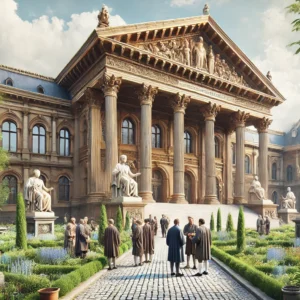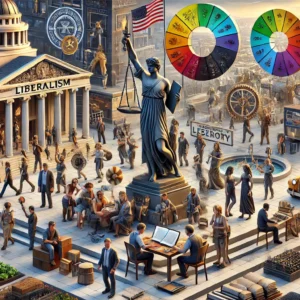Introduction to Liberalism
Liberalism is a political and moral philosophy that emphasizes individual rights, liberty, and equality. Rooted in the Enlightenment era, it advocates for a society where individuals have the freedom to pursue their interests and express their beliefs without undue interference from the government. Liberalism supports the idea that a government’s legitimacy comes from the consent of the governed and that its primary role is to protect the natural rights of its citizens, such as life, liberty, and property.
In the industrialized West, liberalism has played a crucial role in shaping political institutions, economic policies, and social norms. It champions democratic governance, free-market economies, and the rule of law, promoting a system where individuals can thrive based on merit and personal effort. By prioritizing individual autonomy and advocating for minimal state intervention in personal lives, liberalism seeks to create a society where freedom, equality, and justice are accessible to all.
Political ideologies: Political ideologies are sets of beliefs about politics and society that help people make sense of their world and guide political actions. Liberalism is one of the most significant political ideologies.
Liberalism definition: Liberalism is a political and moral philosophy based on liberty, consent of the governed, and equality before the law. It emphasizes individual rights and freedoms, advocating for minimal state intervention in personal lives while supporting a free-market economy.
Influence on the industrialized West: Liberalism has profoundly shaped the political, economic, and social landscapes of the industrialized West. Its principles underpin many modern democracies, influencing governance, economic policies, and societal norms.
Historical Context
Industrial Revolution
The Industrial Revolution, spanning the late 18th and early 19th centuries, was a period of profound transformation that shifted economies from agrarian-based systems to industrial powerhouses. This era marked a significant departure from traditional modes of production, leading to vast changes in economic structures and social dynamics.
Economic Transformation
Rise of Capitalism:
- The Industrial Revolution heralded the rise of capitalism, characterized by private ownership of the means of production and the pursuit of profit. Innovations in technology, such as the steam engine and mechanized manufacturing, enabled mass production and increased efficiency. This shift led to the growth of factories, which became the central units of production, replacing small-scale artisanal workshops and agrarian labor.
Expansion of Markets:
- With the increase in production capacity, goods could be produced on a much larger scale, leading to the expansion of domestic and international markets. Trade flourished as transportation advancements, such as the development of the railway and steamships, facilitated the movement of goods over long distances. This global trade network spurred economic growth and connected different parts of the world in unprecedented ways.
Increased Production and Urbanization:
- The efficiency of industrial production resulted in a surge in the availability of goods, making them more affordable and accessible to a broader population. This economic boom attracted people from rural areas to urban centers in search of employment opportunities in factories. Urbanization, therefore, became a hallmark of the Industrial Revolution, as cities grew rapidly to accommodate the influx of workers.
Creation of New Wealth:
- The Industrial Revolution generated significant new wealth, particularly for entrepreneurs, industrialists, and investors who capitalized on the emerging industrial economy. This new wealth contributed to the rise of a capitalist class, distinct from the traditional landed aristocracy. The economic prosperity also led to increased consumer spending and investment in further industrial expansion.
- These economic transformations laid the groundwork for liberal economic policies that emphasized free markets, competition, and minimal government interference in business. The ideas of Adam Smith, particularly his advocacy for laissez-faire economics, found practical application during this period, promoting the belief that the invisible hand of the market would lead to overall societal benefit.
Social Changes
Rise of the Middle Class:
- One of the most significant social changes brought about by the Industrial Revolution was the emergence of a new middle class. This group comprised factory owners, managers, professionals, and skilled workers who benefited from the economic opportunities created by industrialization. Unlike the traditional social hierarchy, which was dominated by the nobility and the peasantry, the new middle class valued merit, hard work, and economic success. This shift supported liberal values of individualism and the belief that people could improve their social standing through personal effort and entrepreneurship.
Expansion of Educational Opportunities:
- The Industrial Revolution also led to a greater emphasis on education and skills training. As the economy became more complex and technologically advanced, there was a growing demand for educated workers who could operate machinery, manage production processes, and engage in trade and commerce. This demand spurred the establishment of schools, technical institutes, and universities, making education more accessible to a wider segment of the population. Education became a means of social mobility, enabling individuals to acquire the knowledge and skills necessary to participate in the new industrial economy.
Improved Living Standards:
- Over time, the Industrial Revolution contributed to improved living standards for many people, although this progress was not uniform or immediate. Advances in medicine, sanitation, and public health, alongside increased production of consumer goods, gradually improved the quality of life. Urban areas, despite their challenges, provided more opportunities for employment and social interaction compared to rural settings.
Challenges and Reforms:
- The rapid industrialization also brought significant social challenges, including poor working conditions, child labor, and income inequality. These issues led to the rise of labor movements and calls for social reforms. Reformers and political activists advocated for workers’ rights, better wages, and safer working environments, leading to gradual improvements and the establishment of labor laws.
- In summary, the Industrial Revolution was a period of dramatic economic and social change that reshaped societies in profound ways. The rise of capitalism, the expansion of markets, and the creation of new wealth transformed economic structures, while the emergence of the middle class and the expansion of educational opportunities supported liberal values of individualism and self-improvement. These changes laid the foundation for the modern industrialized world and influenced the development of liberal economic and social policies that continue to shape contemporary societies.
Key Principles of Liberalism
Liberalism, as a political philosophy, is rooted in a set of core principles that emphasize the moral worth of the individual, the importance of freedom, reason, equality, toleration, consent, and constitutionalism. These principles form the bedrock of modern democratic societies and have profoundly influenced the political and economic landscapes of the industrialized West. Let’s delve into each principle with exhaustive detail.
INDIVIDUALISM
Individualism is the cornerstone of liberalism, focusing on the inherent moral worth of the individual. It posits that every person is unique and has intrinsic value, deserving respect and the freedom to pursue their own path.
Moral Autonomy
Moral autonomy refers to the capacity of individuals to make their own choices and govern themselves. Liberalism champions the idea that individuals should have the freedom to make decisions about their own lives without undue interference from external authorities. This principle is based on the belief that individuals are rational beings capable of making informed choices that align with their own values and interests.
Personal Development
Liberalism promotes personal development by encouraging individuals to strive for self-improvement and growth. This principle underscores the importance of providing opportunities for education, skill acquisition, and personal enrichment. By fostering an environment where individuals can develop their talents and pursue their aspirations, liberalism supports a dynamic and progressive society.
FREEDOM
Freedom is central to liberal thought, encompassing both negative and positive liberties. It represents the foundation upon which individuals can exercise their rights and pursue their goals.
Negative Liberty
Negative liberty is the freedom from external constraints or interference. It emphasizes the right to act without being hindered by others, particularly the state. This concept is captured by the famous quote from John Stuart Mill: “The only freedom which deserves the name is that of pursuing our own good in our own way.” Negative liberty is about protecting individuals from coercion and allowing them to live their lives as they see fit.
Positive Liberty
Positive liberty is the capacity to act on one’s free will and achieve one’s potential. It involves creating conditions that allow individuals to realize their goals and aspirations. Often, this requires state intervention to remove barriers and provide opportunities. For instance, access to education, healthcare, and social services can empower individuals to lead fulfilling lives. Isaiah Berlin distinguished between these two concepts, highlighting that positive liberty is about enabling individuals to be “their own masters.”
REASON
Liberalism values reason and rational discourse as foundations for progress and decision-making. It trusts in the power of human intellect to improve society.
Rational Discourse
Rational discourse involves open, reasoned discussion and debate. Liberalism supports a society where ideas can be freely exchanged and evaluated based on logic and evidence. The marketplace of ideas, where truth emerges from the competition of diverse viewpoints, is a fundamental concept. As Voltaire famously quipped, “I disapprove of what you say, but I will defend to the death your right to say it.”
Progress
Liberalism believes in progress—the idea that society can improve over time through reason, science, and innovation. This principle is rooted in the Enlightenment belief in human perfectibility and the capacity for advancement. Progress involves continuous improvement in social, economic, and political conditions, aiming to create a better world for future generations.
EQUALITY
Equality in liberalism means ensuring equal rights and opportunities for all individuals. It is about leveling the playing field so that everyone has a fair chance to succeed.
Equal Rights
Liberalism advocates for equal rights under the law, ensuring that all individuals are treated fairly and without discrimination. This principle is enshrined in documents such as the Universal Declaration of Human Rights, which states that “all human beings are born free and equal in dignity and rights.”
Equality of Opportunity
Equality of opportunity means providing everyone with the same chances to succeed, regardless of their background. It involves removing barriers that prevent individuals from reaching their potential. This might include measures to ensure access to quality education, fair employment practices, and social support systems. The aim is to create a meritocratic society where individuals can achieve based on their abilities and efforts.
TOLERATION
Toleration is a liberal principle that promotes acceptance and coexistence of diverse beliefs and practices. It is about respecting the rights of others to live according to their own values.
Moral Diversity
Moral diversity recognizes the existence of different values and lifestyles. Liberalism encourages respect and acceptance of this diversity, allowing individuals to pursue their own conceptions of the good life. This principle is vital for maintaining social harmony in pluralistic societies.
Free Speech
Free speech is the right to express one’s opinions without censorship or restraint. It is a fundamental aspect of liberal societies, ensuring open dialogue and the exchange of ideas. As George Orwell noted, “If liberty means anything at all, it means the right to tell people what they do not want to hear.” Free speech is essential for the functioning of democracy and the protection of individual rights.
CONSENT
Consent is the principle that political power should be derived from the consent of the governed. It is about legitimacy and accountability in governance.
Democratic Governance
Democratic governance means that political leaders are elected by and accountable to the people. Liberalism supports democratic systems where citizens have a voice in decision-making through free and fair elections. This principle ensures that government reflects the will of the people and operates with their consent.
Social Contracts
Social contracts are agreements among individuals to form a society and establish a government. Liberalism is based on the idea that governments are legitimate only if they have the consent of the governed. This concept, articulated by philosophers like John Locke and Jean-Jacques Rousseau, underscores the importance of mutual agreement and cooperation in political arrangements.
CONSTITUTIONALISM
Constitutionalism is the principle that government authority is derived from and limited by a constitution. It ensures that power is exercised within a legal framework that protects individual rights.
Rule of Law
The rule of law means that laws apply equally to all individuals, including those in power. It ensures fairness and prevents arbitrary rule. This principle is fundamental to maintaining justice and order in society. As John Adams stated, “We are a government of laws, not of men.”
Checks and Balances
Checks and balances are mechanisms to prevent any one branch of government from becoming too powerful. Liberalism supports a system where power is divided and regulated to protect individual rights. This principle, embedded in the structure of many modern democracies, ensures that no single entity can dominate and abuse power.
Classical Liberalism
Classical liberalism emphasizes individualism and negative liberty, advocating for minimal state intervention in personal lives. It champions free markets and limited government.
Individualism and Negative Liberty
Classical liberalism stresses the importance of individualism and negative liberty, where freedom is defined as the absence of coercion.
Egoistical Individualism
Egoistical individualism is the belief that individuals should prioritize their own interests. Classical liberalism views this as a driving force for progress and innovation. By focusing on self-interest, individuals contribute to economic growth and societal advancement.
Non-Interference
Non-interference means that the state should not interfere in individuals’ lives except to protect their rights. Classical liberals argue for limited government intervention, believing that individuals are best equipped to make decisions about their own lives.
Minimal State Concept
The minimal state concept is a key aspect of classical liberalism, advocating for a government that performs only essential functions.
Limited Government
Limited government means that the state should only perform necessary functions, such as maintaining law and order, protecting property rights, and providing defense. This approach minimizes the potential for government overreach and protects individual freedoms.
Laissez-Faire Economics
Laissez-faire economics is the idea that the economy functions best with minimal government intervention. Classical liberals support free markets and competition as means to promote prosperity. Adam Smith’s “invisible hand” metaphor captures this concept, suggesting that individuals pursuing their own interests unintentionally contribute to the overall good of society.
Modern Liberalism
Modern liberalism builds on classical principles but emphasizes positive liberty and the need for state intervention to create fair conditions.
Positive Liberty and State Intervention
Modern liberalism supports the idea of positive liberty, where freedom involves the capacity to act on one’s free will.
Enabling Freedom
Enabling freedom involves creating conditions that allow individuals to achieve their potential. Modern liberals support state actions that remove barriers to personal development, such as providing education and healthcare.
Equality of Opportunity
Equality of opportunity is central to modern liberalism. It involves ensuring that all individuals have the same chances to succeed, often requiring state intervention to level the playing field. This may include affirmative action policies, anti-discrimination laws, and social programs.
Welfare Liberalism and Economic Management
Modern liberalism supports welfare policies and economic management to ensure social justice and economic stability.
Social Welfare
Social welfare programs aim to provide a safety net for individuals, ensuring access to essential services like healthcare, education, and social security. These programs help protect individuals from economic hardship and promote social cohesion.
Regulated Capitalism
Regulated capitalism involves government intervention to regulate markets and prevent abuses. Modern liberals believe that regulation can ensure fair competition and protect consumers and workers. This approach seeks to balance the benefits of free markets with the need for social and economic justice.
Conclusion
Liberalism has profoundly influenced the political and economic landscapes of the industrialized West. Its principles of individualism, freedom, reason, equality, toleration, consent, and constitutionalism have shaped modern democracies and economies. While classical liberalism emphasizes minimal state intervention and free markets, modern liberalism supports state actions to ensure positive liberty and social justice. Understanding liberalism is crucial for students of politics, as it provides a foundation for analyzing contemporary political and economic issues. By studying liberalism, students can appreciate the importance of individual rights, democratic governance, and the balance between freedom and equality in shaping modern societies.




